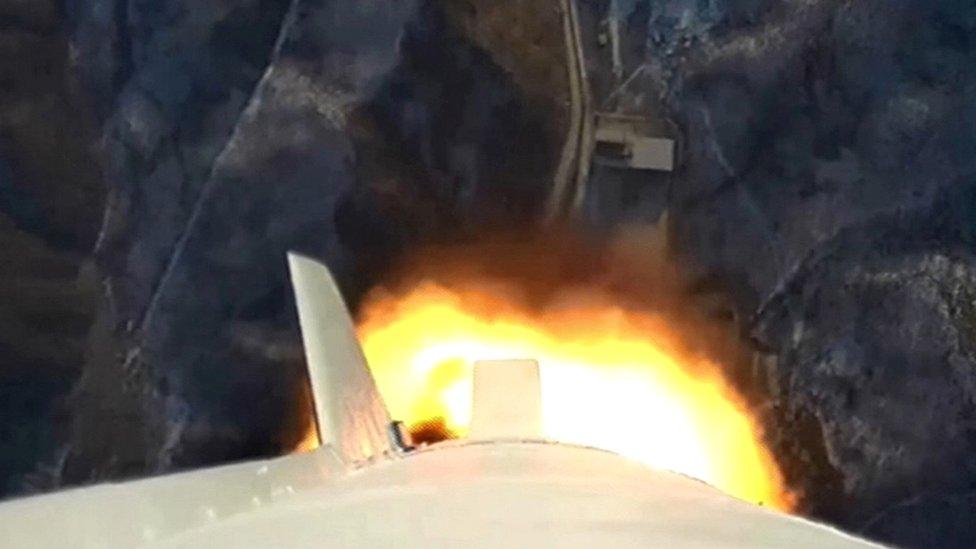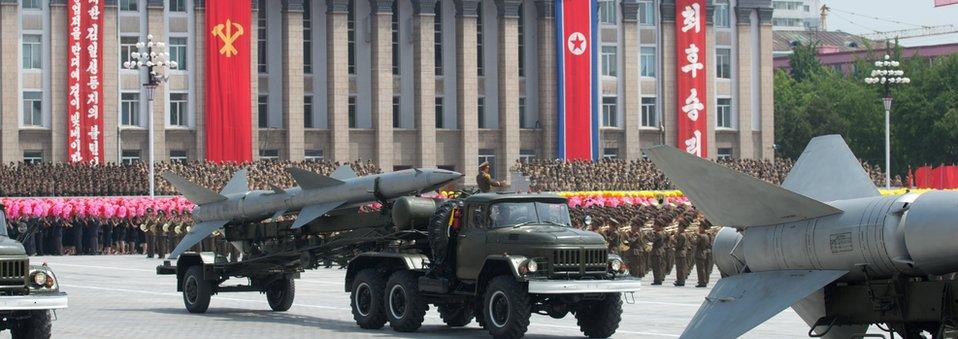US to help South Korea develop missile defence system
- Published

An image from the rocket was broadcast on North Korean TV
The US will help South Korea deploy an advanced missile defence system as soon as possible, officials from the Pentagon have said.
They say the shield will help South Korea offset the growing threat posed by North Korea following its launch of a long-range rocket on Sunday.
North Korea put a satellite or some other space device into orbit at the launch, US officials said on Monday.
But it used the test as cover for a long-range missile launch, they say.
Officials in Pyongyang for their part are adamant that the test was part of the country's peaceful space programme.
In position
American and South Korean officials say they will soon begin formal negotiations over deploying the Terminal High Altitude Area Defence System (Thaad) near the border with North Korea.

People in Pyongyang celebrated the launch on Monday

News of the North Korean launch sent shockwaves around the world, especially among near neighbours including Japan
"Without getting into a timeline, we'd like to see this move as quickly as possible," Pentagon spokesman Peter Cook was quoted by the AFP news agency as saying. A defence official told the news agency that that the system could be in position within two weeks of any deployment order.
"We are beginning the consultations now and in the current days with the South Koreans, and we expect that this will move in an expeditious fashion."
The North Korean rocket launch has been denigrated by the US and its allies as another step in its quest to develop an intercontinental ballistic missile capable of striking the American mainland.
Thaad missiles are reported to be highly deployable and work by firing anti-ballistic missiles against enemy missiles either inside or outside the Earth's atmosphere.
Any deployment is likely to be strongly resisted by China which is known to be uneasy about anti-missile hardware so close to its borders.
Mr Cook has insisted that the system is in no way intended to threaten China and would be focused entirely on North Korea.
In an interview with CBS aired on Monday, President Barack Obama said that he was not surprised by the launch, and the US had been concerned about the country's behaviour for some time.
"This is an authoritarian regime," the president said.
"It's provocative. It has repeatedly violated UN resolutions, tested and produced nuclear weapons and now they are trying to perfect their missile launch system."
Sunday's launch came weeks after North Korea conducted a fourth nuclear test. Both acts violate existing United Nations Security Council resolutions.

North Korea's rocket launches

February 2016: Launch of rocket reportedly carrying satellite
May 2015: North Korea announces it has successfully tested a submarine-launched missile for the first time, but scepticism is then poured on the claim
Dec 2012: North Korea launches three-stage rocket, says it successfully put a satellite into orbit; US defence officials confirm object in orbit
Apr 2012: Three-stage rocket explodes just after take-off, falls into sea
Apr 2009: Three-stage rocket launched; North Korea says it was a success, US says it failed and fell into the sea
Jul 2006: North Korea test-fires a long-range Taepodong-2 missile; US said it failed shortly after take-off